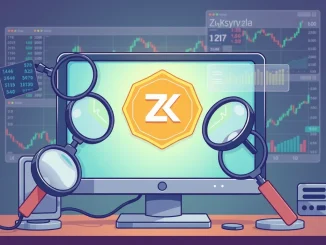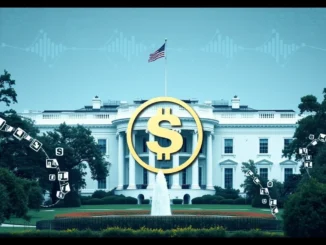
The potential of the South Korea crypto market is back in the spotlight. A recent seminar hosted by the Democratic Party of Korea (DPK), a major political force, has ignited discussions about the nation’s approach to the burgeoning digital asset space. This event, bringing together various crypto experts, signals a potential shift in how South Korea views and intends to interact with the global crypto ecosystem.
Understanding the DPK Crypto Policy Discussion
At the heart of the recent DPK seminar was the urgent call for South Korea to actively engage with the cryptocurrency sector. The party is exploring plans for developing comprehensive policies and regulations, acknowledging the industry’s increasing relevance. This isn’t just about acknowledging crypto; it’s about strategizing for active participation.
Key points highlighted during the discussion include:
- The need for South Korea to position itself strategically in the global crypto landscape.
- Developing a regulatory framework that fosters, rather than hinders, innovation.
- Gathering insights from industry experts, academics, and stakeholders.
- Identifying specific areas for policy development, such as investor protection, market stability, and technological advancement.
Why Lawmaker Lee Un-ju Emphasizes Timely Entry
A prominent voice at the seminar was Lawmaker Lee Un-ju. She strongly advocated for South Korea to make a decisive entry into the crypto market *now*, while the sector is experiencing significant crypto industry growth. Her perspective is that delaying engagement could mean missing opportunities for economic benefit and technological leadership.
Her argument centers on several factors:
- Current Momentum: The global crypto market is expanding rapidly, attracting significant investment and talent.
- Competitive Edge: Other nations are already establishing regulatory clarity and fostering crypto innovation. Proactive engagement can help South Korea remain competitive.
- Future Potential: Cryptocurrencies and blockchain technology are seen as foundational elements for future digital economies. Early involvement allows for shaping this future.
Lawmaker Lee Un-ju’s stance underscores a recognition that the window for strategic entry is tied to the market’s current upward trajectory.
Navigating Korean Crypto Regulation
The discussion around Korean crypto regulation is complex. While there have been regulatory efforts focused primarily on preventing illicit activities and protecting investors from fraud, the DPK’s recent seminar suggests a move towards policies aimed at *accelerating growth*. This involves finding a balance.
Potential areas for refined regulation might include:
| Regulatory Focus Area | Potential Policy Direction |
|---|---|
| Investor Protection | Clearer guidelines for exchanges, disclosure requirements, consumer education. |
| Market Stability | Rules around listing/delisting assets, preventing market manipulation. |
| Innovation & Growth | Support for blockchain startups, clarity on digital asset classifications, favorable tax treatment (potentially). |
| Financial System Integration | Exploring links between traditional finance and regulated crypto services. |
Developing a comprehensive framework requires careful consideration of both risks and opportunities.
The Potential Impact on the South Korea Crypto Market
A clear and growth-oriented Korean crypto regulation framework could have a transformative effect on the South Korea crypto market. Regulatory certainty often attracts institutional investment and encourages established businesses to explore blockchain applications. This could lead to increased liquidity, more innovative services, and greater mainstream adoption.
Benefits of a proactive regulatory approach could include:
- Attracting global crypto companies to establish a presence in South Korea.
- Stimulating domestic innovation in blockchain technology and decentralized applications (dApps).
- Creating new jobs and economic opportunities.
- Providing a safer environment for South Korean citizens to participate in the crypto market.
However, challenges remain. Regulators must navigate the volatile nature of crypto, prevent scams, and ensure compliance with anti-money laundering (AML) and know-your-customer (KYC) standards while simultaneously fostering innovation.
What Lies Ahead for DPK Crypto Policy?
The seminar is likely just the beginning of a more focused effort on DPK crypto policy. The party’s engagement suggests that cryptocurrency and blockchain technology are moving higher on the political agenda. Future steps could involve drafting specific legislative proposals, consulting further with the industry, and working towards cross-party consensus on key regulatory principles.
The push from figures like Lawmaker Lee Un-ju provides momentum, but the path to comprehensive, growth-accelerating regulation is long and requires collaboration across government bodies and with the private sector.
In Conclusion: A Pivotal Moment for South Korea
The recent DPK seminar highlights a pivotal moment for South Korea’s engagement with the digital asset world. With crypto industry growth continuing globally, the call from figures like Lawmaker Lee Un-ju to embrace and regulate the South Korea crypto market for accelerated growth is a significant development. While the details of future Korean crypto regulation are still being shaped, the intent to move beyond basic oversight towards fostering innovation through DPK crypto policy suggests a potentially exciting future for crypto in the nation.
Keeping an eye on these political and regulatory discussions is essential for anyone interested in the future of digital assets in Asia.



